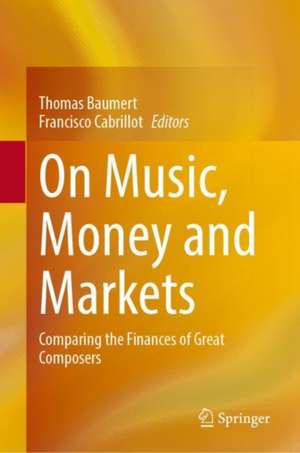On Music, Money and Markets: Comparing the Finances of Great Composers
Editat de Thomas Baumert, Francisco Cabrilloen Limba Engleză Hardback – 31 dec 2023
Preț: 1003.70 lei
Preț vechi: 1224.02 lei
-18% Nou
Puncte Express: 1506
Preț estimativ în valută:
192.05€ • 201.06$ • 158.91£
192.05€ • 201.06$ • 158.91£
Carte tipărită la comandă
Livrare economică 07-21 aprilie
Preluare comenzi: 021 569.72.76
Specificații
ISBN-13: 9783031432255
ISBN-10: 3031432258
Pagini: 250
Ilustrații: XVII, 250 p. 23 illus., 15 illus. in color.
Dimensiuni: 155 x 235 mm
Greutate: 0.55 kg
Ediția:1st ed. 2023
Editura: Springer Nature Switzerland
Colecția Springer
Locul publicării:Cham, Switzerland
ISBN-10: 3031432258
Pagini: 250
Ilustrații: XVII, 250 p. 23 illus., 15 illus. in color.
Dimensiuni: 155 x 235 mm
Greutate: 0.55 kg
Ediția:1st ed. 2023
Editura: Springer Nature Switzerland
Colecția Springer
Locul publicării:Cham, Switzerland
Cuprins
Introduction: On the Economics of Music and the Finances of Great Composers.- Johann Sebastian Bach and Georg Friedrich Händel: The Economics of Late Baroque Market for Music.- Joseph Haydn and Wolfgang Amadeus Mozart: A Collusive Friendship.- Ludwig van Beethoven and Franz Schubert: The Economic Conscious- and Unconsciousness of the Artist.- Gioachino Rossini and Gaetano Donizetti: The Economics of Belcanto I.- Vincenzo Bellini and Giacomo Meyerbeer: The Economics of Belcanto II.- Felix Mendelssohn-Bartoldy and Robert Schumann: Parallel Lives, Liberal Delusions.
Notă biografică
Thomas Baumert is Professor of Economics at the Complutense University of Madrid (Spain). He has been a visiting researcher at the Fraunhofer-ISI Institute in Karlsruhe (Germany) and visiting professor at the Westfälische Wilhelms-Universität of Münster (Germany). His research ―which has resulted in a wide range of publications in high-impact national and international journals and publishers― has been funded by prominent institutions, including the European Union, the United States Department of Homeland Security, the German Historical Institute of Washington and the Ministry of Economy, Industry and Competitiveness. He is a permanent member of the scientific committee of the International Conference on Applied Economics (ICOAE) and patron of the Cultural Foundation of the Valencian Community "Salvador Tuset Tuset".
Francisco Cabrillo is Emeritus Professor of Economics at the Complutense University of Madrid (Spain) and Senior Professor of Economics at the Universidad Internacional de La Rioja (Spain). With an outstanding academic record, he has been visiting fellow at the Universities of Princeton, Rome and Oxford. From 1990 to 2008 he was director of the European Erasmus Program in Law and Economics in Spain. He is director of the Master in Law and Economics of the EAE Business School and of the Harvard Seminar in Law and Economics (Fundación Rafael del Pino-Harvard University). He has held relevant positions in public administration, being Chairman of the Socioeconomic Committee of Madrid from 2004 to 2011.
Textul de pe ultima copertă
Did you know that Bach invested in mines? That Rossini improved his income by running casinos in the opera houses which on weekends performed his operas? Or that Puccini composed shorter arias to make them fit the length of gramophone disks as they reported him huge revenues? Or who was, in financial terms, the most successful classical composer in history? This book —the first of its kind— studies and compares the finances of twenty classical composers in their historical and economical context. Each chapter details and quantifies the sources of income of these musicians (wages, royalties, subsidies, percentages over the number of performances, arrangements, investments in the musical sector, etc), thus allowing to estimate the income they obtained due to their artistic — primarily compositional, but also related— activities. In addition, it also estimates the composer’s expenditures, thus drawing a relatively complete image of their personal finances. This not only allows to concludeto create a ranking of composers according to their economic success, but —more importantly— for the first time gives an accurate image of the financial situation of a broad set of composers. This allows to correct many false believes while also giving new insights on the relation between economics and music history.
Caracteristici
Discusses the role of music in the history of economic thought Gives unique insights into the finances of great composers in their historic-economical context Compares the income (and expenditure) of pairs of composers that opted for different market models
